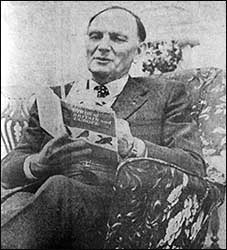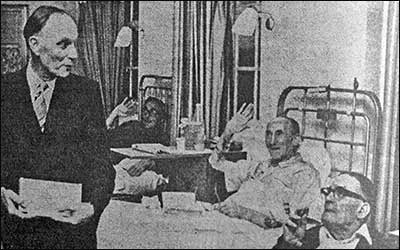|
Signs like “Respect your town – do not spit” reflected the anxiety of the townsfolk who lived in fear of contracting the disease.
Dr Fisher, Dr Gerrard and their colleagues knew there was a high incidence in factories, particularly among boot and shoe workers. And they struck on a revolutionary idea – to mass screen thousands of workers with then recently developed X-ray equipment. They put their heads together with shoe manufacturers and bosses of other industries and arranged to visit factories and car parks to screen, they hoped, nearly every adult in Rushden.
It was a daunting task. It took three years for everyone to be X-rayed. The promising results spurred the hard-worked team of doctors and nurses to carry on. Their work was helped, as luck had it, by the introduction of new potent drugs that were effective, especially when TB was discovered at an early stage. “And once a patient was receiving treatment, he was no longer a risk to the general public,” said Dr Fisher.
He and Dr Gerrard have just retired as chest consultants at Rushden Hospital.
Dr Fisher is a 66-year-old Yorkshireman whose spirit and dedication hides his wartime anguish. He was in the Colonial Medical Service before coming to Rushden, working in Malaya from 1937—1949. He was interned by the Japanese for the last three and a half years of the war. The most harrowing part was when, accused of spying, he spent six months detained by the Japanese secret police, the Gestapo of the East.
Understandably, it’s an experience he won’t readily talk about, only to say the secret police was shunned by ordinary Japanese soldiers. It was probably during this internment he contracted TB. “I was sent home by the Malayan Government to study methods of treatment for tuberculosis and it was then discovered I had it.” War prisoners, underfed and overworked had low resistances against diseases, especially in the tropics.
He moved to Rushden in 1949 and was joined by Dr Gerrard three years later. When they started, some 90 per cent of the patients at Rushden Hospital, or the Sanatorium as it was then, had TB. Last year, the hospital team dealt with 452 admissions of which less than ten per cent were TB cases.
The most common diseases they have had to treat in recent years are bronchial disorders and lung cancer. And the problem of lung cancer is more daunting than tuberculosis, said Dr Fisher. “We were always hoping we would find some effective drugs for TB and these were discovered. The question of cancer is a much bigger problem. It is more depressing because we can do far less for it.
“There is a terrific amount of research going on and I think it is very probable that there will be a solution to the cancer problem eventually,” said Dr Fisher. He said it would be impossible to reintroduce a mass X-ray scheme to screen adults for cancer. It would take three years to screen everyone in the Rushden area and in that time a cancer victim could contract the disease and die. If you ask him how smoking has aggravated treatment he will say: “I am in the same business as tobacco companies. If they pack up then I’m out of work too. Chronic bronchitis and lung cancer are both far more common in cigarette smokers.”
Dr Fisher, of Lancaster Street, Higham Ferrers, is now to work part-time at Manfield Hospital, Northampton. Dr Gerrard (61), of Higham Road, Rushden, is to return to his native Scotland.
|

